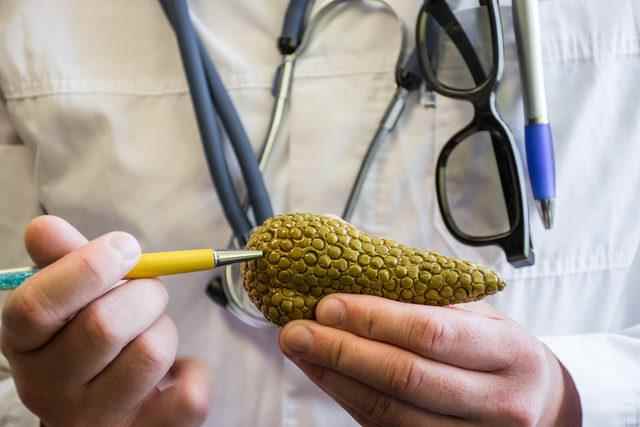While pancreatic cancer ranks 9th among all cancers in terms of frequency, it ranks 4th in cancer-related deaths. As such, scientists are working on new methods to reduce their place among the ‘deadliest’ cancer types to the lowest ranks. Today, thanks to the developments in treatment methods and technological advances, pancreatic cancer, which progresses insidiously and is thought to be too late when it gives symptoms, can be among the diseases that can be treated.
Stating that approximately 8,500 people are diagnosed with pancreas in our country every year, Acıbadem Altunizade Hospital General Surgery Specialist Prof. Dr. Murat Gönenç emphasizes that various developments and new approaches such as the replacement of open surgeries by closed surgeries, the development of neoadjuvant treatments, and the joint decision-making of different specialists on treatment increase the success of treatment. prof. Dr. Murat Gönenç answered 10 questions about pancreatic cancer treatment and made important warnings and suggestions.
IS THE STAGE OF THE TUMOR IMPORTANT IN TREATMENT?
A treatment plan is not made without determining the stage of the disease. Even in its early stages, pancreatic cancer can spread to distant regions through lymph fluid, blood, and nerve tissue. Studies show that these patients have cancer cells circulating in their blood, and that these cells spread to distant areas and form new cancer foci called metastases. Factors such as the spread of cancer and whether it is seen in other organs reveal the stage of the disease. Explaining that pancreatic cancer is roughly divided into four stages, Prof. Dr. Murat Gönenç states that staging plays an important role in choosing treatment methods and increasing the success of these methods.

WHICH IS THE MOST EFFECTIVE TREATMENT METHOD?
Surgical treatment, which is the most effective treatment in pancreatic cancer, gives the opportunity to confirm that the cancerous tissue has been removed completely and with clean borders. Stating that the aim in cancer surgery is to remove the tumor without cutting, shredding, tearing, in short, without damaging the tumor and leaving no tumor residue behind. Dr. Murat Gönenç says, “The indispensable element of a long-term and permanent treatment response in pancreatic cancer is surgical treatment.” However, other treatment methods are often used in addition to surgery. It is generally not possible to defeat pancreatic cancer with only surgical treatment without the support of other methods, especially chemotherapy. Determining which of these methods to use and in which order is the backbone of a good treatment scheme. All patients who received chemotherapy before surgery and received a good response are candidates for surgical treatment.

DOES THE STAGE OF THE PANCREA BE Clarified BEFORE THE SURGERY?
Before the surgery, the stage of the disease is tried to be determined clinically with some imaging techniques. However, although all necessary examinations have been made before surgery in patients who have undergone surgery, it is possible to detect a more advanced stage during and after surgery. During surgery, it can be seen that small cancer foci in the abdomen spread around the large vessels. Pathological examination of cancerous tissues taken during surgery is performed, and these results may be more advanced than the preoperative clinical stage.

WHAT ARE THE FACTORS INCREASING THE SUCCESS RATE OF TREATMENT?
Advances in surgical technology, anesthesia and intensive care techniques, as well as general medical care, have a positive impact on the results of pancreatic cancer surgery. “Once, pancreatic surgery was as infamous as pancreatic cancer,” said Prof. Dr. Murat Gönenç said, “Thanks to the developments in surgical technique and technology, the mortality rate due to large pancreatic surgeries has decreased below 2-3 percent today.” he continues. At the same time, developments in chemotherapy and radiotherapy are other factors that increase success. The effect of the treatment is increased by using surgical and oncological methods to support each other according to the condition of the disease.
IS THE SURGERY METHOD IMPORTANT?
Today, the increasing experience in pancreatic cancer allows most of the operations in pancreatic surgery to be performed by closed method. Closed methods; laparoscopic and robotic surgery. Scientific studies show that when it comes to pancreatic cancer surgery, there is no difference between open and robotic methods in cancer surgery. However, closed surgeries provide the patient with significantly less pain, rapid recovery and a rapid return to normal life. This provides significant gains for the patient in the postoperative period.
SURGERY OR CHEMOTHERAPY FIRST?
Emphasizing that the answer to this question can be given in tumor councils attended by experts from all branches that play a role in the diagnosis, treatment and follow-up of cancer, Prof. Dr. Murat Gönenç said, “The best decision is made by considering many factors such as the general health status of the patient, the stage of the disease and the risks of surgical treatment. Roughly, it is preferable to start the treatment with chemotherapy, except for the first stage.
CAN ADVANCED STAGE PANCREATIC CANCER BE TREATED?
Reminding that until recently, it was believed that surgical treatment had no place in fourth and even third stage pancreatic cancer. Dr. Murat Gönenç said, “Thanks to the developing chemotherapy drugs and protocols, it was observed that some of the patients at this stage responded very well to chemotherapy. Regardless of the stage, all patients with a very good response to chemotherapy should be considered as possible surgical treatment candidates.
IS CHEMOTHERAPY MUST BE USED IN THE TREATMENT?
Although surgery is the main treatment method in pancreatic cancer, it is not enough on its own. Pointing out that chemotherapy, which is the only method that affects cancer cells in the whole body, is an effective element in the treatment, since the disease tends to spread to other organs. Dr. Murat Gönenç said, “Chemotherapy can reduce the main cancer focus. In this way, tumors that were not suitable for surgical removal before may become suitable for surgery and the success of surgical treatment can be increased. Moreover, it is a very important gain that it can affect cancer cells throughout the body.”
WHEN TO APPLY TO BEAM TREATMENT?
Stating that radiation therapy is also used in the treatment of pancreatic cancer, Prof. Dr. Murat Gönenç said, “This method can be used as an adjunct to chemotherapy if the cancer has progressed too far in the area where it originated. Sometimes, if it is suspected that cancer cells remain after the surgery, radiation therapy may be preferred.” says.
WHY IS NEOADJUVAN TREATMENT DONE?
One of the most important concepts that emerged in the development of cancer treatment is “neoadjuvant therapy”. In cancers, the most effective method of which is surgery, starting treatment with other methods, even if there is no obstacle for surgery, is called “neoadjuvant therapy”.
Although its place in pancreatic cancer is still controversial, Prof. Dr. Murat Gönenç explains the reasons for this as follows: “There are many reasons for neoadjuvant treatment. First of all, pancreatic cancer can spread to distant parts of the body even in earlier stages. Cancer cells that have spread to the system must be destroyed by chemotherapy. In addition, response to chemotherapy is evaluated before surgical treatment. Because it is not usually possible to achieve successful results with surgical treatment alone in a disease that is unresponsive to chemotherapy. Another important benefit is that it can shrink the tumor and increase the chance of success in surgical treatment. We also prevent the loss of time that may be experienced in starting chemotherapy due to the problems that may occur after surgery.”
